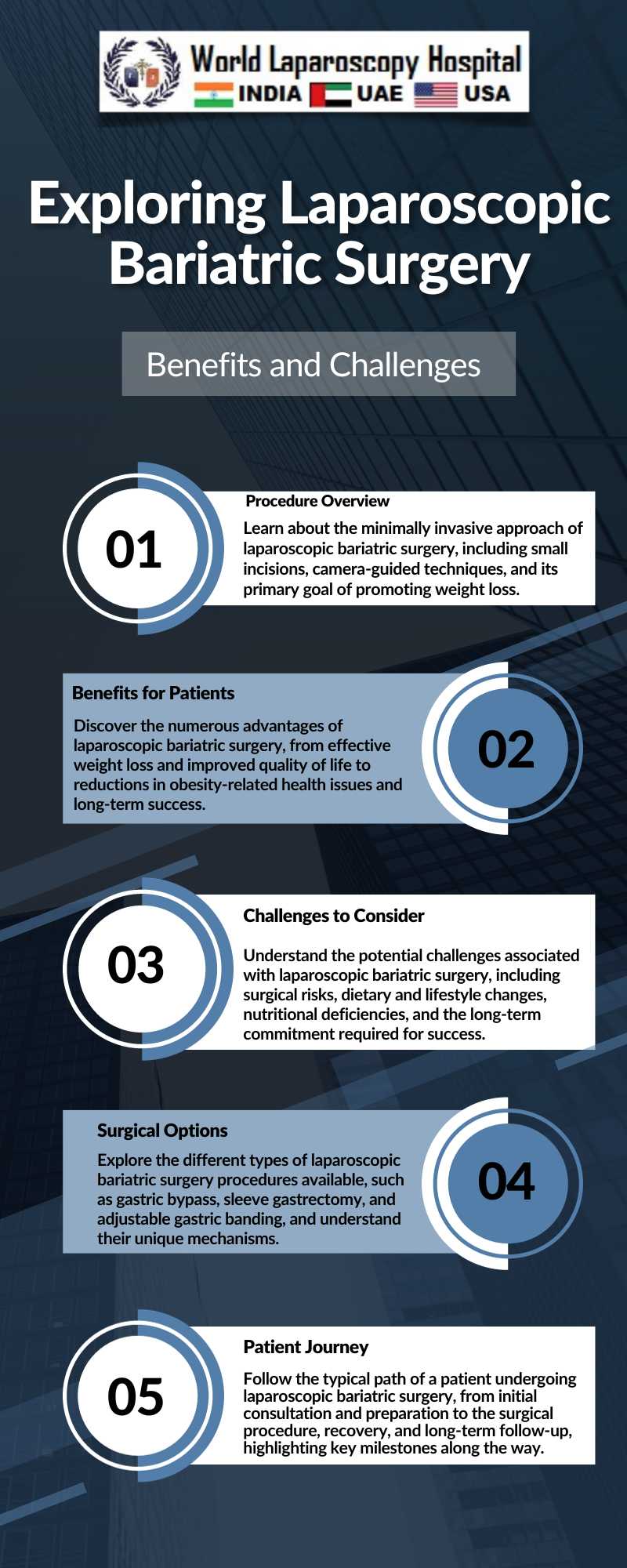Introduction
In recent years, the prevalence of obesity has reached epidemic proportions worldwide, leading to a surge in the demand for effective weight loss interventions. One such intervention that has gained popularity is laparoscopic bariatric surgery. This minimally invasive surgical approach offers both benefits and challenges for patients and healthcare professionals alike. In this article, we will delve into the world of laparoscopic bariatric surgery, exploring its benefits and addressing the challenges it presents.

Understanding Laparoscopic Bariatric Surgery
Laparoscopic bariatric surgery, often referred to as minimally invasive weight loss surgery, involves making small incisions in the abdomen through which surgical instruments and a camera are inserted. This camera, known as a laparoscope, provides a real-time view of the surgical site on a monitor, allowing the surgeon to perform the procedure with precision. The primary goal of laparoscopic bariatric surgery is to reduce the size of the stomach or reroute the digestive system to promote weight loss.
Benefits of Laparoscopic Bariatric Surgery
1. Minimally Invasive Nature: One of the most significant advantages of laparoscopic bariatric surgery is its minimally invasive approach. Traditional open surgeries often involve large incisions, leading to extended recovery times and increased pain. With laparoscopic techniques, patients experience smaller incisions, reduced pain, and shorter hospital stays.
2. Effective Weight Loss: Numerous studies have shown that laparoscopic bariatric surgery can result in significant and sustained weight loss. Patients often achieve substantial reductions in body mass index (BMI) and experience improvements in obesity-related comorbidities, such as diabetes and hypertension.
3. Improved Quality of Life: Weight loss achieved through laparoscopic bariatric surgery often leads to improved quality of life. Patients report enhanced mobility, increased energy levels, and a sense of accomplishment, which can positively impact their overall well-being.
4. Reduction in Obesity-Related Health Issues: Laparoscopic bariatric surgery has been shown to reduce the risk of various obesity-related health issues, including heart disease, sleep apnea, and joint problems. This can lead to a longer and healthier life for patients.
5. Enhanced Metabolic Benefits: Certain bariatric procedures, such as gastric bypass surgery, can have significant metabolic effects beyond weight loss. These surgeries can improve insulin sensitivity, which is particularly beneficial for individuals with type 2 diabetes.
6. Long-Term Success: Unlike many non-surgical weight loss methods, laparoscopic bariatric surgery often results in long-term weight loss success. Patients can maintain their weight loss for years, provided they adhere to dietary and lifestyle changes.
Challenges of Laparoscopic Bariatric Surgery
1. Surgical Risks: While laparoscopic bariatric surgery is generally safe, like any surgical procedure, it carries risks. Complications such as infection, bleeding, and injury to surrounding organs can occur. However, the risk of these complications is typically lower with minimally invasive techniques compared to open surgery.
2. Dietary and Lifestyle Changes: Bariatric surgery necessitates significant dietary and lifestyle changes. Patients must adhere to strict dietary guidelines and incorporate regular physical activity into their routines to achieve and maintain weight loss. Compliance with these changes can be challenging for some individuals.
3. Nutritional Deficiencies: Patients who undergo certain bariatric procedures, such as gastric bypass, are at risk of developing nutritional deficiencies. This is due to the altered anatomy of the digestive system, which can impair the absorption of essential nutrients. Regular monitoring and supplementation are essential to prevent deficiencies.
4. Psychological Impact: Weight loss surgery can have a profound psychological impact on patients. Some individuals may experience post-surgical depression, body image issues, or changes in their relationships. Comprehensive pre- and post-operative counseling and support are crucial to address these challenges.
5. Cost and Accessibility: Access to laparoscopic bariatric surgery can be limited by factors such as cost and insurance coverage. Not all individuals who could benefit from these procedures have access to them, which can be a significant barrier to treatment.
6. Long-Term Commitment: Bariatric surgery is not a quick fix; it requires a lifelong commitment to dietary and lifestyle changes. Patients must be prepared for this ongoing dedication to maintaining their weight loss and overall health.
Conclusion
Laparoscopic bariatric surgery offers a promising solution to the obesity epidemic, providing substantial benefits to patients in terms of weight loss and improved health. However, it is essential to acknowledge and address the challenges that accompany these procedures, from surgical risks to the need for lifelong dietary and lifestyle changes. By carefully considering the benefits and challenges, patients and healthcare professionals can make informed decisions about the suitability of laparoscopic bariatric surgery as a treatment option for obesity. Ultimately, successful outcomes depend not only on the surgery itself but also on the ongoing commitment of patients to their health and well-being.